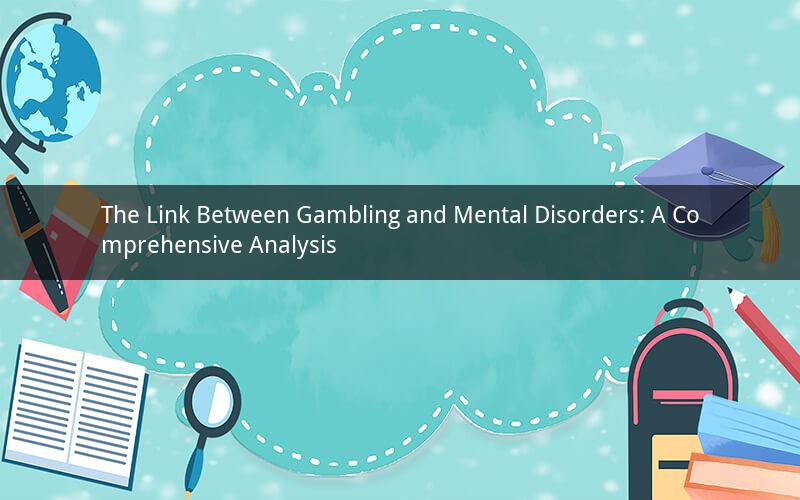
Introduction:
Gambling has long been a topic of interest among researchers, psychologists, and the general public. With the increasing popularity of online gambling, concerns have been raised about its potential association with mental disorders. This article aims to delve into the relationship between gambling and mental health issues, exploring various aspects such as the prevalence of gambling disorders, common mental disorders associated with gambling, and potential treatment approaches.
1. Understanding Gambling Disorders:
Gambling disorders, also known as gambling addiction, are characterized by uncontrollable and problematic gambling behavior. According to the American Psychiatric Association, gambling disorder is classified under the category of addictive disorders in the Diagnostic and Statistical Manual of Mental Disorders (DSM-5). It is essential to recognize the signs and symptoms of gambling disorders to identify individuals who may be at risk for mental health issues.
1.1 Prevalence of Gambling Disorders:
Research suggests that gambling disorders affect a significant portion of the population. According to the National Council on Problem Gambling, approximately 2-3% of the adult population in the United States has a gambling disorder. This percentage may vary across different regions and demographics.
1.2 Risk Factors for Gambling Disorders:
Several risk factors contribute to the development of gambling disorders. These include genetic predisposition, environmental factors, and personal vulnerabilities. Genetic research indicates that certain individuals may have a genetic predisposition to develop gambling-related problems. Additionally, exposure to gambling activities, peer pressure, and financial stress can increase the risk of developing gambling disorders.
2. Mental Disorders Associated with Gambling:
Gambling disorders are often associated with various mental health issues. These include but are not limited to depression, anxiety, substance abuse, and personality disorders. Understanding the link between gambling and these mental disorders is crucial in developing effective treatment approaches.
2.1 Depression:
Depression is a common mental disorder associated with gambling. Individuals with depression may turn to gambling as a means of escaping their emotional pain or seeking a sense of control. Unfortunately, gambling can exacerbate depressive symptoms, leading to a vicious cycle.
2.2 Anxiety:
Anxiety disorders are also frequently observed in individuals with gambling problems. The fear of losing money or the anticipation of negative consequences can trigger anxiety. This anxiety can further perpetuate the gambling behavior, as individuals seek to alleviate their anxiety through gambling.
2.3 Substance Abuse:
Substance abuse is often intertwined with gambling disorders. Individuals with gambling problems may turn to alcohol or other substances as a means of coping with the emotional distress associated with gambling. Conversely, substance abuse can also contribute to the development of gambling disorders.
2.4 Personality Disorders:
Certain personality disorders, such as borderline personality disorder or antisocial personality disorder, may increase the risk of developing gambling problems. Individuals with these disorders may exhibit impulsive behaviors, poor judgment, and a lack of self-control, which can contribute to problematic gambling behavior.
3. Treatment Approaches for Gambling-Related Mental Disorders:
Treating gambling-related mental disorders requires a comprehensive approach that addresses both the gambling behavior and the underlying mental health issues. Various treatment modalities have been found to be effective in treating gambling disorders and associated mental health problems.
3.1 Cognitive Behavioral Therapy (CBT):
Cognitive Behavioral Therapy (CBT) is a widely recognized treatment approach for gambling disorders. CBT focuses on identifying and changing negative thought patterns and behaviors associated with gambling. It helps individuals develop healthier coping mechanisms and reduce the urge to gamble.
3.2 Medication:
In some cases, medication may be prescribed to manage co-occurring mental health issues, such as depression or anxiety. Antidepressants and anti-anxiety medications can be used to alleviate symptoms and improve overall mental well-being.
3.3 Support Groups:
Support groups, such as Gamblers Anonymous, provide individuals with a platform to share their experiences, receive peer support, and develop a sense of community. These groups can be a valuable resource for individuals struggling with gambling-related mental disorders.
3.4 Family Therapy:
Family therapy can be beneficial in addressing the impact of gambling on relationships and helping family members understand and cope with the challenges associated with gambling disorders.
Frequently Asked Questions:
1. How can I determine if I have a gambling disorder?
If you find yourself experiencing the following signs and symptoms, it may be an indication of a gambling disorder:
- Feelings of guilt or remorse after gambling
- Needing to gamble more and more to achieve the desired excitement
- Efforts to stop gambling, but unsuccessful
- Difficulty managing financial obligations due to gambling
- Neglecting personal, family, or work responsibilities due to gambling
2. Can gambling disorders be treated?
Yes, gambling disorders can be treated. Effective treatment approaches include cognitive behavioral therapy, medication, support groups, and family therapy. It is essential to seek professional help from a mental health provider specializing in gambling disorders.
3. How does gambling affect mental health?
Gambling can have a significant impact on mental health, leading to various mental disorders such as depression, anxiety, substance abuse, and personality disorders. The stress and financial strain associated with gambling can exacerbate existing mental health issues or trigger new ones.
4. Can medication help treat gambling disorders?
Medication can be prescribed to manage co-occurring mental health issues, such as depression or anxiety. However, medication alone is not sufficient to treat gambling disorders. A comprehensive treatment approach that includes therapy and support is essential.
5. How can I support someone with a gambling disorder?
Supporting someone with a gambling disorder involves understanding the challenges they face and offering empathy and support. Encourage them to seek professional help, attend support groups, and maintain open communication. It is important to educate yourself about gambling disorders to better understand and support your loved one.